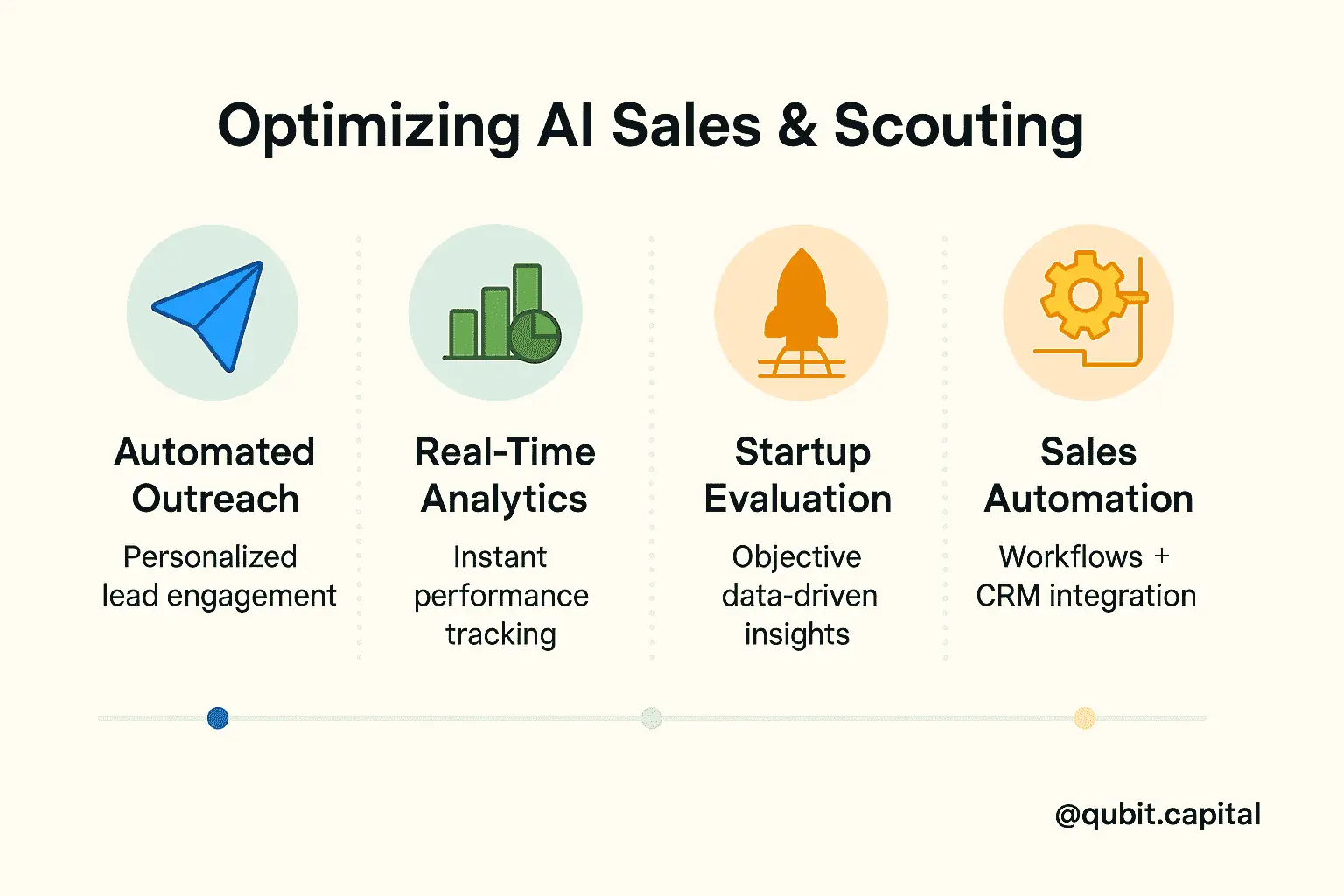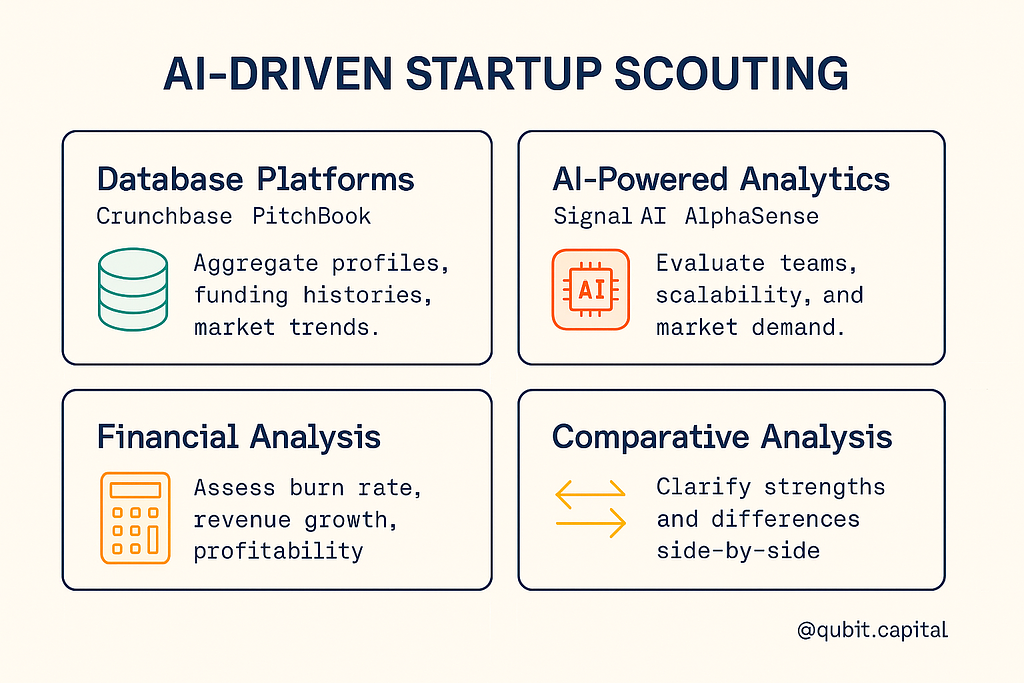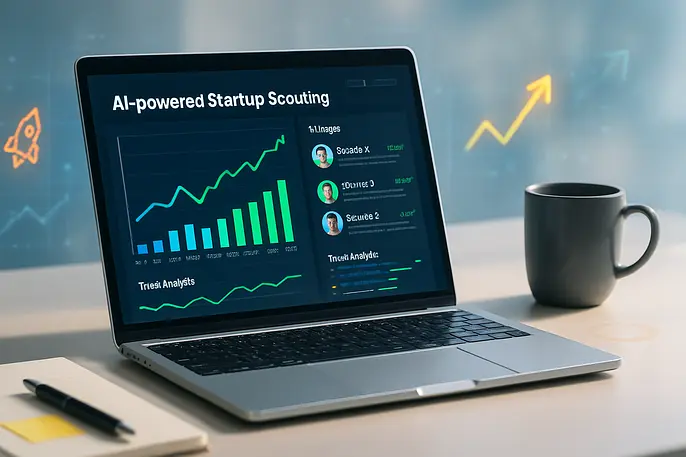Artificial intelligence is reshaping the way startups are discovered and evaluated, offering unprecedented efficiency and precision. With the technology scouting software market projected to grow at a 17.6% compound annual growth rate (CAGR), the adoption of AI-driven platforms is accelerating rapidly. This shift is particularly evident in venture capital, where 29% of firms now integrate AI into their processes, streamlining decision-making and uncovering hidden opportunities.
The transition from manual scouting to AI-powered solutions is not just a trend—it’s becoming the industry standard. For those exploring the broader implications of AI in capital acquisition, AI tools for fundraising provide a compelling perspective on how innovation is transforming the fundraising landscape.
Let’s explore how these tools are revolutionizing startup scouting.
Effective Vendor Solutions for Technology Scouting
Technology scouting has become a cornerstone for organizations aiming to stay ahead in innovation. To streamline this process, several platforms offer centralized solutions that combine crowdsourced insights, automated data aggregation, and advanced analytics. This section evaluates leading platforms such as Qubit Capital, InnovationCast, HYPE Innovation, Traction Technology, ITONICS, and Wellspring Worldwide, focusing on their integration of scalable AI, real-time analytics, and collaborative workflows.
1. Qubit Capital: AI Matchmaking for Fundraising and Deal Flow
The Qubit Capital platform automates investor discovery, mapping, and personalized outreach, using relevancy scoring and predictive analytics to align check size, stage, sector, and geography with each opportunity. By aggregating real-time signals across public sources and proprietary network data, the platform surfaces the right investors at the right moment while guiding founders on optimal timing and messaging. Its end-to-end support, including data room preparation and pitch collateral, reduces operational friction so teams can focus on execution.
With a network of 20,000+ investors (including venture, private equity, and corporate strategics), Qubit Capital has facilitated $215M+ across 64+ startups worldwide, often compressing the path to investor meetings from months to weeks.
2. InnovationCast: From Ideation to Execution
InnovationCast stands out for its ability to transform ideas into actionable outcomes. Its platform is designed to automate technology scouting through crowdsourced insights, making it ideal for organizations seeking to harness collective intelligence. For instance, the InnovationCast platform enables seamless workflow management, ensuring that ideas are not only captured but also developed into tangible solutions.
A notable example of its impact is Visa’s use of InnovationCast, where the platform helped the company scout emerging technologies and realize measurable ROI. This case study highlights how organizations can achieve strategic goals by aligning technology scouting with business objectives. For a deeper dive into the platform’s capabilities, refer to their detailed overview on innovation management software by InnovationCast.
3. HYPE Innovation: AI-Driven Insights for Market Trends
HYPE Innovation excels in leveraging AI to provide deeper market insights, making it a powerful tool for technology scouting. The HYPE Innovation platform integrates enterprise-level collaboration with AI-driven analytics, enabling organizations to identify and act on emerging trends efficiently. This combination of advanced technology and collaborative features ensures that teams can work cohesively while staying informed about the latest developments in their industry.
4. Traction Technology: Simplifying Complex Scouting Processes
Traction Technology focuses on simplifying the often complex processes involved in technology scouting. By offering tools that centralize data aggregation and provide real-time analytics, the platform empowers organizations to make informed decisions quickly. Its user-friendly interface and robust analytics capabilities make it a preferred choice for businesses looking to streamline their innovation pipelines.
5. ITONICS: Comprehensive Innovation Management
ITONICS is known for its comprehensive approach to innovation management. The platform combines scalable AI with real-time analytics to provide a holistic view of the technology landscape. Its collaborative workflows enable teams to work together seamlessly, ensuring that insights are shared and acted upon effectively. ITONICS is particularly well-suited for organizations that require a scalable solution to manage their innovation efforts across multiple departments.
6. Wellspring Worldwide: Bridging the Gap Between Research and Application
Wellspring Worldwide specializes in bridging the gap between research and practical application. The platform’s focus on automated data aggregation and real-time analytics makes it a valuable asset for organizations looking to translate research insights into actionable strategies. Its collaborative features further enhance its utility, enabling teams to work together to identify and implement innovative solutions.
Optimizing AI-Powered Sales and Startup Scouting
AI-powered tools are transforming how businesses approach sales and startup scouting, offering unparalleled efficiency and precision. These advanced solutions automate outreach, provide real-time engagement analytics, and streamline the evaluation process, enabling teams to focus on high-value opportunities.

Automating Outreach for Seamless Lead Generation
One of the standout features of AI in sales is its ability to automate outreach. By analyzing customer data and behavior, these tools craft personalized messages that resonate with potential leads. This not only saves time but also ensures that communication is tailored to the recipient’s needs. Additionally, AI-driven systems can schedule follow-ups, track responses, and refine messaging strategies based on engagement metrics.
For instance, sales teams can use AI to identify the best times to reach out to prospects, increasing the likelihood of a positive response. This level of automation allows businesses to scale their outreach efforts without compromising on personalization.
Real-Time Engagement Analytics
Understanding how prospects interact with your outreach is crucial for refining your strategy. AI-powered tools provide real-time engagement analytics, offering insights into which messages are opened, links clicked, and responses received. These analytics help teams identify what’s working and what needs adjustment, ensuring that every interaction is optimized for success.
Moreover, real-time data enables sales teams to act quickly, responding to interested leads while their interest is still high. This agility can make the difference between closing a deal and losing a prospect to a competitor.
Enhancing Startup Evaluation with AI
When it comes to scouting startups, AI is revolutionizing the evaluation process. Traditional methods of assessing startups often involve manual research and subjective judgment, which can be time-consuming and prone to bias. AI tools, on the other hand, analyze vast amounts of data—from financial performance to market trends—to provide objective insights.
These tools can identify promising startups by evaluating factors such as growth potential, competitive positioning, and team expertise. By automating this process, investors and corporate teams can focus on building relationships with the most promising candidates.
For those looking to refine their startup communications, a nuanced discussion on AI pitch deck builder tools bridges your understanding of streamlined presentation creation with the evolving nature of startup communications.
Driving Efficiency with Sales Automation
AI doesn’t just enhance individual tasks; it transforms entire workflows. Sales automation tools integrate seamlessly with CRM systems, automating repetitive tasks like data entry, lead scoring, and pipeline management. This ensures that sales teams spend less time on administrative work and more time closing deals.
Additionally, AI can predict future sales trends, helping teams allocate resources effectively. By analyzing historical data and market conditions, these tools provide actionable insights that drive strategic decision-making.
AI-powered sales and scouting tools are no longer optional—they’re essential for staying competitive in a fast-paced market. By automating outreach, providing real-time analytics, and streamlining evaluation processes, these solutions empower teams to achieve more with less effort.
Diverse Community Insights Driving AI Startup Scouting
The dynamic world of AI startup scouting thrives on diverse perspectives and collaborative discussions. By pooling expert opinions and comparative analyses, communities are shaping a more informed approach to selecting tools that drive strategic investment decisions.
The Power of Expert Aggregation
AI tools for startup scouting come in various forms, each tailored to specific needs. Some focus on sales automation, streamlining outreach and lead generation, while others specialize in detailed startup comparisons, offering granular insights into market positioning and growth potential. Expert communities play a pivotal role in evaluating these tools, bringing together diverse viewpoints that highlight strengths, weaknesses, and unique functionalities.
For instance, a tool designed for sales automation might excel in identifying high-potential startups but fall short in providing in-depth competitor analysis. Conversely, a comparison-focused platform might offer robust data visualization but lack integration with CRM systems. By aggregating expert opinions, communities help investors and businesses identify tools that align with their specific objectives, ensuring a balanced and strategic approach.
Diversity as a Strategic Advantage
Community-driven insights go beyond technical evaluations. They emphasize the importance of diversity in shaping investment strategies. Different industries, regions, and market segments require tailored approaches, and the tools selected must reflect these nuances.
For example, a startup scouting tool that performs well in the tech sector may not be as effective in healthcare or fintech. By fostering discussions among professionals from varied backgrounds, communities ensure that scouting tools are evaluated through multiple lenses. This diversity not only enhances decision-making but also minimizes the risk of overlooking high-potential startups in niche markets.
Comparative Analyses: A Key to Informed Decisions
Comparative analyses are at the heart of community-driven discussions. These analyses often highlight how tools differ in terms of functionality, user experience, and scalability. For instance, one tool might offer advanced AI-driven predictions but require significant upfront customization, while another might prioritize ease of use at the expense of detailed analytics.
Such comparisons enable investors to weigh trade-offs and prioritize features that align with their goals. Whether the focus is on identifying emerging trends, assessing startup viability, or streamlining communication, comparative analyses provide the clarity needed to make informed choices.
Shaping the Future of AI Scouting
The collective wisdom of communities is transforming the way AI tools are selected and utilized in startup scouting. By emphasizing diversity and fostering collaboration, these discussions ensure that investment strategies are both innovative and inclusive.
Trending Social Media Insights on Startup Scouting
Social media platforms have become a treasure trove of insights for startup enthusiasts, investors, and innovators. Discussions on platforms like Reddit, Twitter, and LinkedIn often highlight the latest trends in startup scouting, particularly in the realm of AI tools and community-driven strategies. These conversations not only reflect the pulse of the innovation ecosystem but also offer actionable takeaways for those looking to refine their technology scouting approaches.
AI in Startup Scouting: A Hot Topic
One of the most discussed themes across social media is the role of artificial intelligence in transforming startup scouting. Reddit threads, for instance, are buzzing with debates on how AI tools are streamlining the identification of promising startups. Users frequently share their experiences with AI-powered platforms that analyze market trends, assess startup viability, and even predict future performance. These tools are being celebrated for their ability to process vast amounts of data quickly, enabling scouts to focus on high-potential opportunities.
However, the sentiment isn’t universally positive. Some community members express concerns about over-reliance on AI, arguing that human intuition and qualitative assessments remain irreplaceable. This ongoing dialogue underscores the need for a balanced approach that combines technological efficiency with human expertise.
Real-Time Community Sentiment and Emerging Trends
Social media also serves as a barometer for real-time community sentiment, which can significantly influence startup scouting strategies. For example, trending hashtags on Twitter often reveal emerging industries or technologies gaining traction. Similarly, LinkedIn posts by thought leaders frequently highlight startups that are disrupting traditional markets.
Reddit’s niche communities, such as r/startups and r/entrepreneur, are particularly valuable for uncovering grassroots trends. These forums allow users to share unfiltered opinions, success stories, and cautionary tales, providing a well-rounded view of the startup landscape. For scouts, monitoring these discussions can offer early insights into sectors poised for growth, from green tech to blockchain applications.
The Power of Community-Driven Insights
What sets social media apart as a resource for startup scouting is its community-driven nature. Unlike traditional market reports, social media discussions are dynamic and interactive, allowing scouts to engage directly with innovators, investors, and other stakeholders. This collaborative environment fosters a deeper understanding of market needs and potential solutions.
For instance, a Reddit thread discussing the challenges of scaling AI startups might inspire scouts to explore companies addressing those specific pain points. Similarly, a viral LinkedIn post about a groundbreaking health tech innovation could prompt further investigation into that sector. These real-time insights are invaluable for staying ahead in the competitive world of startup scouting.
By curating and analyzing these social media conversations, scouts can not only identify promising startups but also adapt their strategies to align with current trends and community expectations. This approach ensures that their efforts remain relevant and impactful in a rapidly evolving innovation landscape.
Comprehensive Strategies and Tools for AI-Driven Startup Scouting

The process of identifying promising startups has evolved significantly with the integration of advanced tools and methodologies. AI-driven startup scouting now combines robust data platforms, intelligent analytics, and financial evaluation tools to streamline decision-making. This section explores the key dimensions of these tools, offering actionable strategies and comparisons to refine your approach to startup evaluation.
1. Startup Database Platforms: Building a Foundation
Startup database platforms serve as the cornerstone for scouting efforts. These platforms aggregate vast amounts of data, including company profiles, funding histories, and market trends. Tools like Crunchbase, PitchBook, and CB Insights provide comprehensive datasets that allow investors to filter startups by industry, funding stage, and geographic location.
For example, Crunchbase offers a user-friendly interface for tracking emerging companies, while PitchBook excels in delivering detailed financial metrics. By leveraging these platforms, investors can identify high-potential startups and gain insights into their competitive positioning.
2. AI-Powered Analytics: Enhancing Precision
Artificial intelligence has revolutionized the way startups are evaluated. AI-powered tools analyze vast datasets to uncover patterns and predict future performance. These tools assess factors such as market demand, team dynamics, and product scalability, providing a more nuanced understanding of a startup's potential.
One standout feature of AI-driven analytics is their ability to process unstructured data, such as social media mentions and news articles. This capability enables investors to gauge public sentiment and identify emerging trends. For instance, tools like Signal AI and AlphaSense use natural language processing to track real-time developments, offering a competitive edge in identifying startups poised for growth.
3. Financial Analysis Tools: Evaluating Viability
Financial analysis tools are indispensable for assessing the viability of early-stage startups. These tools evaluate key metrics such as burn rate, revenue growth, and profitability, helping investors determine whether a startup is financially sustainable.
Platforms like Carta and Visible provide detailed financial dashboards that simplify the evaluation process. Carta, for instance, specializes in cap table management, while Visible focuses on performance tracking and investor updates. By integrating these tools into their workflow, investors can make data-driven decisions with greater confidence.
4. Social Listening and Real-Time Analytics: Staying Ahead
Social listening tools and real-time analytics platforms offer invaluable insights into market sentiment and emerging trends. These tools monitor online conversations, news articles, and social media posts to identify shifts in consumer behavior and industry dynamics.
For example, Brandwatch and Sprinklr enable investors to track brand mentions and sentiment analysis, providing a deeper understanding of a startup's market perception. By incorporating these insights into their scouting process, investors can identify startups that align with current market demands.
5. Comparative Analysis: Optimizing the Evaluation Process
Comparative analysis is a critical component of startup scouting. By evaluating multiple startups side by side, investors can identify key differentiators and make informed decisions. An analysis comparing qubit vs pitch deck softwares reveals subtle distinctions in functionality, enriching your insights into competitive evaluation within the startup ecosystem.
For readers interested in direct comparisons of presentation and pitch deck software solutions, explore the detailed analysis here (https://qubit.capital/blog/qubit-vs-pitch-deck-software).
Conclusion
The strategies and insights explored throughout this article highlight the dynamic tools and methodologies shaping startup scouting. From vendor solutions to AI-driven sales tools and community insights, each approach offers unique advantages for identifying promising startups. The rapid growth of the market underscores the transformative ROI potential of adopting AI technologies in scouting processes, enabling investors to make data-driven decisions with greater precision.
At Qubit Capital, we are committed to empowering investors with actionable, data-driven advisory services tailored to startup success. If you're ready to refine your scouting process and identify high-potential startups aligned with your investment goals, our Startup Scouting services are designed to help you succeed. Let’s connect and achieve your investment objectives together.
Key takeaways
- AI-driven startup scouting is experiencing rapid growth, underpinned by robust market metrics such as a 17.6% CAGR.
- Vendor solutions are crucial in providing centralized, collaborative, and automated technology scouting.
- AI sales tools significantly improve lead generation and the startup evaluation process.
- Community insights and social media trends offer real-time perspectives that shape effective scouting strategies.
- A comprehensive approach combining database aggregators, AI analytics, and financial tools delivers a strategic advantage in startup scouting.
Frequently asked Questions
What are the best AI tools for startup scouting?
The best AI tools combine real-time analytics, automated data aggregation, and community insights to streamline your startup scouting process.


 Back
Back



